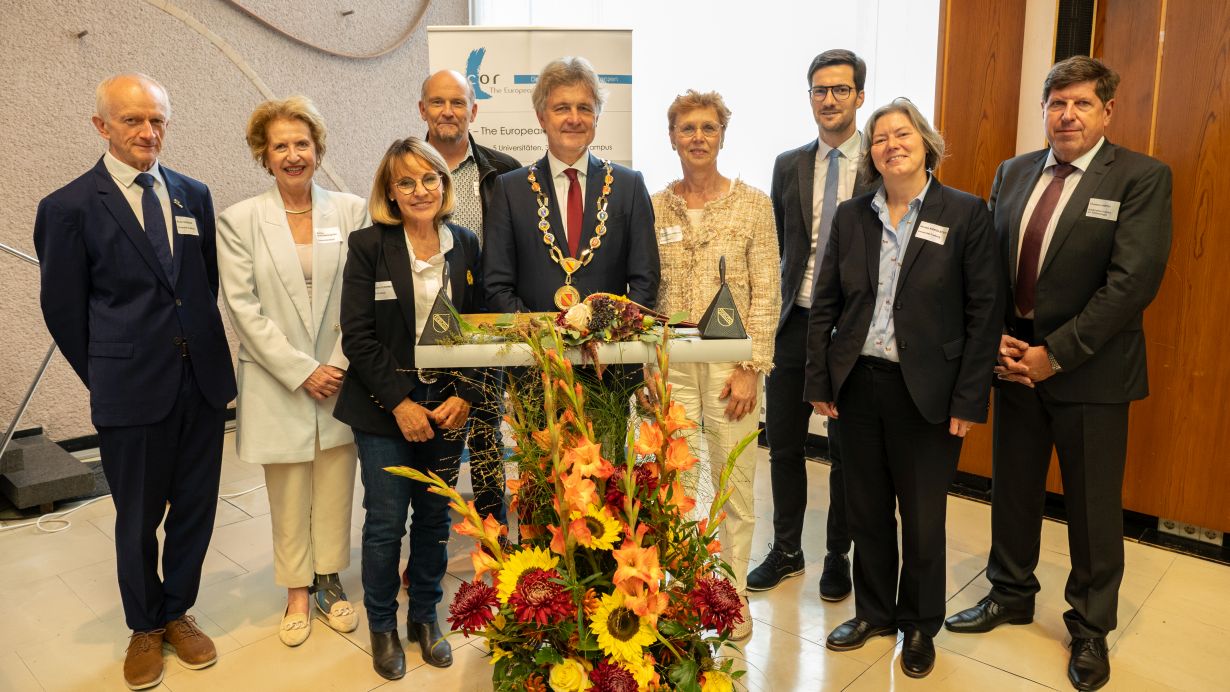
The second Eucor Cities Meeting on October 12, 2023 in Karlsruhe focused on intensifying the cooperation of universities and cities on the Upper Rhine. Karlsruhe Institute of Technology (KIT) and the city of Karlsruhe hosted the meeting of top representatives of the trinational Eucor Confederation and the cities of the Eucor universities. They all agreed on the goal to further strengthen the region as a location of innovations.
"Eucor is a shining example of how cooperation of universities and cities can connect and strengthen a region across borders," said Professor Thomas Hirth, KIT Vice President Transfer and International Affairs and Vice President of the Eucor Confederation. "In Karlsruhe, the city and KIT have been cooperating closely for many years now. We at KIT attach high importance to the concept of transfer and the integration of citizens in our research."
"Research and academic education live on an extensive exchange with each other. Now, the cities will be integrated as well. The meeting in Karlsruhe has not only brought the five Eucor member universities and the cities closer together. Also we in Karlsruhe, with KIT as our University of Excellence, profit from Eucor. That is why I am very happy to host this meeting," said Lord Mayor of Karlsruhe Dr. Frank Mentrup. The entries of all participants in the Golden Book of the City of Karlsruhe underscored the importance of the trinational meeting.
The Eucor member universities understand themselves as places of science, the innovative and transformative power of which will only be fully effective in cooperation with the corresponding cities. "The Upper Rhine area already is a leading region of innovations in the medical engineering and pharmaceutical sectors worldwide. We would like to strengthen this region and to enhance its visibility, for industry and investors in particular," said Professor Andrea Schenker-Wicki, Eucor President and Rector of Basel University.
New areas of cooperation between the universities and cities were a central subject of the meeting at the Karlsruhe city hall. Among others, three projects of cities and their respective universities were presented: The "Sustainability Association" for the sustainable transformation of the Upper Rhine region launched by the University and city of Freiburg, the "Railway Manifest of the Cities on the Upper Rhine" initiated by Strasbourg, and the "Biocampus Upper Rhine" that is aimed at enhancing cooperation of public and private stakeholders of the healthcare sector. The latter project of several Eucor universities and cities is coordinated by the University of Basel.
About Eucor - The European Campus
Eucor - The European Campus is a trinational confederation of five universities on the Upper Rhine. These are the universities of Basel, Freiburg, Haute Alsace, Strasbourg, and Karlsruhe Institute of Technology (KIT). The universities pool the competencies of 15,000 researchers, 13,500 doctoral researchers, and 117,000 students in a region of strong research and economy spanning France, Germany, and Switzerland. The goal is to establish a clearly profiled science space with international outreach.
Further Information (in German): www.eucor-uni.org
Detailed Caption: Intensive cooperation: Heads of universities and cities at the Eucor Cities Meeting in Karlsruhe. From left to right: Professor Michel Deneken (University of Strasburg), Professor Andrea Schenker-Wicki (University of Basel), Isabelle Fuhrmann (Agglomeration Colmar), Professor Alain Dieterlen (University of Haute Alsace), Dr. Frank Mentrup (City of Karlsruhe), Michèle Sengelen-Chiodetti (City of Colmar), Martin Horn (City of Freiburg), Professor Kerstin Krieglstein (University of Freiburg), Professor Thomas Hirth (KIT). (Photo: Monika Müller-Gmelin, Presse- und Informationsamt Stadt Karlsruhe)
Being "The Research University in the Helmholtz Association", KIT creates and imparts knowledge for the society and the environment. It is the objective to make significant contributions to the global challenges in the fields of energy, mobility, and information. For this, about 9,800 employees cooperate in a broad range of disciplines in natural sciences, engineering sciences, economics, and the humanities and social sciences. KIT prepares its 22,300 students for responsible tasks in society, industry, and science by offering research-based study programs. Innovation efforts at KIT build a bridge between important scientific findings and their application for the benefit of society, economic prosperity, and the preservation of our natural basis of life. KIT is one of the German universities of excellence.






